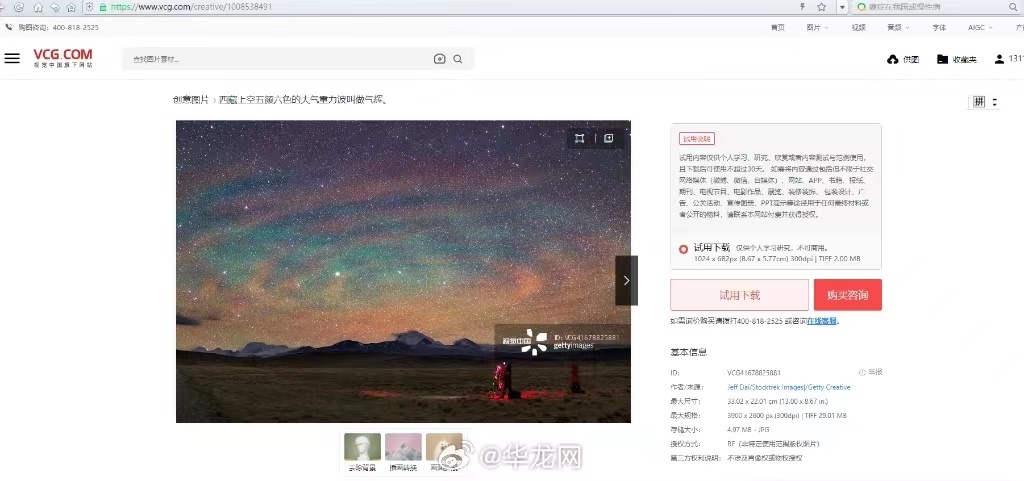Major Chinese photo agency Visual China Group (VCG) has come under fire after it sought 86,500 yuan ($11,853) from an astrophotographer for posting 173 photos that VCG claims to own the copyright to. However, all the pictures were taken by the photographer himself and never uploaded to VCG. The photo agency has now found itself caught in the middle of a huge controversy surrounding its history of copyright over-claiming.
Although VCG later stated that they obtained legal licenses for these works from other platforms, the photographer refused to accept the explanation. Stocktrek Images, to which Dai uploaded these photos, said on Wednesday that it has contacted VCG and demanded it remove the photos, Chinese media outlets reported.
As the two sides continue to tussle, the Chinese internet is once again buzzing with discussion about copyright ownership.
Dai Jianfeng, also known as Jeff Dai, is a specialist in astronomical photography with a fanbase of over 2 million users on his personal Sina Weibo account. On Tuesday afternoon, he fired an accusation at VCG, saying it was seeking compensation from him for using his own photos, which he described as “outrageous.”
“Today, I got a call from VCG saying that my public post had used 173 of their photos in a manner that breaches their copyright and that I will have to pay them over 80,000 yuan,” Dai wrote on his Sina Weibo account on Tuesday afternoon.
When Dai looked into the claim, he found that all the “infringing photos” turned out to be photos he had taken himself.
“I have never worked with VCG on these photos and never uploaded them to their gallery,” Dai said, questioning why VCG would own the copyright to the photos and ask him to pay compensation.
According to screenshots Dai posted of the email he claims was sent to him by VCG, the photo agency said that Dai made unauthorized use of the images, several of which were taken in 2018. VCG offered two solutions, a partnership between the parties for 300 yuan per photo, or a settlement between the parties in which Dai would pay 500 yuan for each photo.
These photos can indeed be downloaded from the VCG gallery. Author information for some of the images was listed as Jeff Dai/Stocktrek Images/Getty Creative.
Dai then demanded VCG provide an explanation for “where it obtained the photos that were sold illegally” and “how much illegal profit it has made.”
VCG responded on Tuesday night by claiming that the images were licensed by Dai to the stock photo library Stocktrek Images for sale, which in turn licensed them to Getty Images for sale. VCG is the exclusive partner of Getty Images in the Chinese mainland and therefore has the right to sell these images.
The chain of sales authorizations for the images in question is clear and complete, said VCG, promising to continue communicating with the photographer to “properly address the misunderstanding.”
However, Dai again refuted VCG’s claims on Wednesday, stating that Stocktrek Images had confirmed to him that VCG does not have the right to sell his work, nor does it have any copyrights to his work. Getty Images also does not have the right to re-license his work.
“There is no misunderstanding here,” he said.
“To this day, you [VCG] continue to illegally sell my work online, falsely claiming to me and others that you own the copyright to it. Please stop your infringing behavior immediately!”
According to the information disclosed by both parties so far, the copyright of the relevant pictures is owned by the photographer, Yue Shenshan, a Beijing-based lawyer, told the China News Service.
If what Dai disclosed is true, then Getty Images has no right to sublicense the images, which means VCG does not have the right to sell the images and its actions have violated the photographer’s copyright, said Yue.
After Dai exposed this incident, many netizens voiced support in his defense, noting that the over-assertion of copyrights by big platforms like VCG has been a long-standing problem.
Some netizens have pointed out that neither side has yet shown concrete evidence to show whether or not Dai ceded the copyrights to the photos when he sold his work.
However, Dai had revealed in a Sina Weibo post in 2018 that he had signed contracts with VCG. It is not clear whether the content of the signing between the two parties is related to the photos in this incident.
Whether or not the photographer’s own use of his or her work is infringing depends on the specific agreement between the two parties when the photographer licensed his or her work to the photo agencies, Yue said.
VCG has stirred controversy on several occasions over past years. In 2019, it claimed copyright over the first-ever photo of a black hole as well as the Chinese flag and national emblem, prompting an online debate on Chinese copyright practices. After the exposure of the latest controversy, many companies have also revealed that their company logos have been listed as copyrighted VCG images.
VCG and its subsidiaries filed more than 2,000 lawsuits alleging copyright violations in 2017 and 2018 alone.
(Global Times)




